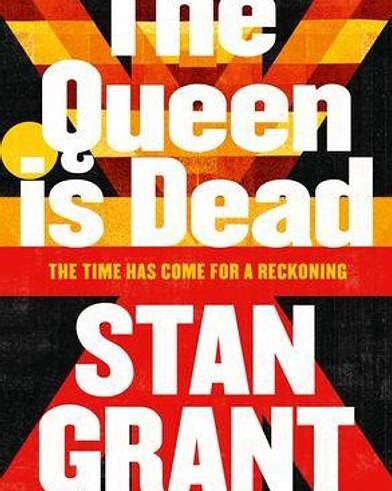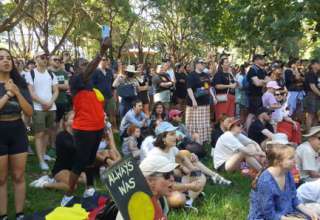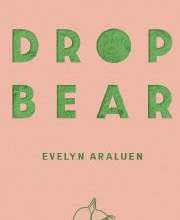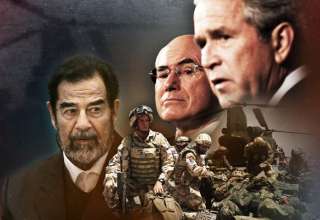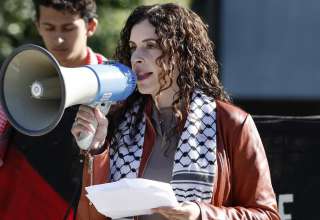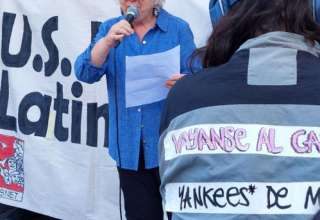By Wallace McKitrick
This article begins with a biographical note about Stan Grant (Junior), then discusses statements made by Grant at the time of the death of the English monarch in September 2022. We go on to review aspects of his latest book The Queen is Dead (Fourth Estate, Sydney, 2023), and end with brief comment on the May 2023 avalanche of attacks on Grant in the Murdoch media and other media avenues after his participation in a panel discussion during the coronation ceremonies for the new monarch. Rather than focus only on the individual, this article tries to place Grant’s stance and the vilification of him in a larger context of the movement for Indigenous peoples’ self-determination.
Biographical note: Stan Grant
Uncle Stan Grant is a Wiradjuri and Kamilaroi man. Grant’s mother, Elizabeth, is celebrated by him as a gifted storyteller and writer of poems. His father, Stan Grant (Senior) – who as a boy saw his grandfather arrested for speaking Wiradjuri – has been a powerhouse in revival of Wiradjuri language for forty years. Grant (Junior), after growing up in various parts of regional NSW with material scarcity but a rich family life, became a cadet journalist with the Australian Broadcasting Corporation in the 1980s.
Now one of Australia’s most respected and awarded journalists, he has worked for the ABC, SBS, the Seven Network, and for a decade he served as a Senior International Correspondent for CNN in Asia and the Middle East. Over the course of his career he has received several prestigious international and Australian awards. In 2015, Grant published his Walkley Award–winning book Talking to My Country, and also won a Walkley Award for his coverage of Indigenous affairs. Since then he has had published another three books, Australia Day (2019), With the Falling of the Dusk (2021), both national bestsellers, and The Queen is Dead (2023).
In 2016 Grant was appointed to the Referendum Council on Indigenous recognition. In recent years, Grant has been the ABC’s International Affairs Analyst and host of ‘Q&A’. He is currently Professor of Indigenous Belonging at Charles Sturt University.
[Sources: Sydney Writers’ Festival 2023, ABC at https://www.abc.net.au/news/stan-grant/8195640], and Grant’s book The Queen is Dead]
Grant’s initial remarks about the British monarchy and colonialism
On 18 September 2022, at the time of the death of the English queen Elizabeth II, an article by Grant titled ‘My Mother’s Son’ was published in ABC News Online (at https://www.abc.net.au/news/2022-09-18/queen-death-indigenous-australia-colonisation-empire/101445508 ). He expressed anger and sadness at a widespread white Australian orthodoxy that ‘this week … we aren’t supposed to talk about colonisation, empire, violence, about Aboriginal sovereignty, not even about the republic’ and he went on to speak of ‘the abuse that comes, and will come’, from those who ‘don’t like Aboriginal people who speak up’. His prediction that ‘online trolls will target my family with the most foul language, even threats of physical violence’ proved accurate by May 2023, as we will recount later in this article.
The ABC News editors were hesitant about publishing Grant’s article. When they did consent, the article ‘became the most read piece of the ABC’s entire print coverage of the White Queen’s death. What were they so afraid of? … The ABC [had] not wanted to step out of line, and yet it [was] out of step with the people it is meant to serve.’ (p 254 The Queen is Dead)
Grant’s book The Queen is Dead
This book weaves together family history, childhood memories, historical facts, and significant political observations. Throughout is a strand of thoughtful personal reflection seeking answers to questions such as ‘Where and to whom do I belong?’ (which all of us residing in Australia might ask ourselves), ‘Can we forgive, put aside resentment, keep speaking to people who … will not hear?’, ‘What do we do after catastrophe? How does a courageous people make a transition to a new world, a new way of being?’
The persona of professional journalist maintained in prior publications is put aside, in favour of courageous emotional honesty and depth. It’s obvious that a great deal of pain has generated this writing, and only an unsympathetic reader could withhold an emotional response along with admiration of his frankness. The writing style features short, staccato sentences. Not only does this make the work accessible to a wide range of readers, it allows him to ‘dance’ around a topic, coming at it from several angles with speed. Grant’s storytelling ability and visual imagery, together with swift flashes of insight, add poetic vitality.
Whiteness
Analytically, Grant employs the concept of ‘Whiteness’ which has emerged in the last few decades in social and political theory as a tool for examining power relationships in conjunction with racialised ideas of nation and culture. He avoids giving credence to the idea of ‘race’, explaining that it has always been a cultural-ideological construct unsupported by any facts from genetic science or from the history of human migration. ‘Whiteness’, notes Grant, ‘is never about White skin but about power, about imposing a hierarchy of civilisation, with Whiteness – the idea – at the top.’ As a system of inclusion and exclusion through myths designed to dehumanise selected categories of people, it’s relevant to Empire in all forms. He understands the Whiteness inherent in the so-called US-led ‘global rules-based order, which is rooted in a race-based order.’ (p34)
By itself, Whiteness can provide only limited insight into societies. But twinned with an understanding of class dynamics (in the sense pioneered by Marx) and of the core mechanism of capitalism and its imperative to – among other things – establish colonies, Whiteness can have explanatory value. Grant gets part of the way there. For example:
‘Democracy is in retreat. It has lost its moral core. Democracy has been captured by big money and big power. … Demagogues exploit anxiety and fear, fan racism and xenophobia to claim power. These false prophets promise to return nations to some fantasy of former glory. … Whiteness as an organising principle is exhausted. … History, the very thing it created, is turning to strike with a vengeance. The pillars of Whiteness – liberalism and democracy – buckle under the strain.’ (pp17-18)
‘Liberalism is inseparable from race. Liberalism is a shell game. It appears to make race disappear, but the truth is it’s just hidden under a veil of Whiteness.’ (p47)
Similarly:
‘Damn Australia … for what it did to my family, what it did to countless Black families, Black families with White blood more often than not, but families who could never be White. Damn the White Queen too. … Her crown is the Crown that stole this country – it is the Crown that smashed Black lives. These things were done in her name. Let’s not forget, too, that in her time, during her reign, the crimes against us continued.’ ‘Dispossession … continued into the twentieth century … [expanding] White Australia, as the people from Mapoon have never forgotten.’ (pp 77-78)
Nor does Grant fall back to a simplistic pro-Republic stance:
‘How silly to think that becoming a Republic would give us meaning. What would it be to replace the monarchy with an Australian head of state? Would we not be the same nation … built on emptiness [terra nullius]? … Without justice for First Nations, while ever we suffer, then republic is just another word, like discovery or invasion or settlement or colony. … Isn’t there a bigger question here? How do we find peace in a place where we still cannot truly talk to each other. … We are part of a place. Before a republic, we have to know what it means to be here. We have to know where we are.’ (pp 270-272)
Grant has come to see that liberal democracy since its birth in the rising European merchant classes of the 17th-18th centuries has always been an ideology of inclusion and exclusion, with shifting boundaries according to strategic need. In the same spirit, he sees that nationalistic ‘identity politics’ is rooted in narcissistic myths of race and purity which are a feature of fascist movements, and he identifies the new AUKUS agreement with a ‘race-based military bloc of White countries.’ (p35).
The ABC perpetuating racist practices
In a chapter titled ‘Betrayed’, Grant discusses systemic racism in the Australian Broadcasting Corporation, for which he has worked for forty years. Describing it as ‘White to the core’ in its management arrangements and its programming and production orientation in general, he acknowledges it is changing slightly and ‘too slowly’, and that he has been one of very few exceptions who have ‘breached the wall’ to be ‘behind enemy lines’. But non-White staff, he says, still never feel fully accepted and are subjected to racist comments from some colleagues despite managerial mottoes about not tolerating racism in the workplace. I am ‘acceptable’, he says, ‘Black enough without being too much; just enough for White people to feel good but not threatened, but I will not make it comfortable for Whiteness, … not be another brick in the monument of their greatness. [At this time of adulation of the English monarchy] I will not put on a black suit and tie, … lower my voice, bend my knee, bow my head to the White Queen.’ (p239)
In the news media, observes Grant, ‘Balance can be an absurd notion. … Where is the balance in brutality, in crimes against humanity? … As journalists we cling to our objectivity. But that is a lie. There is nothing objective about the way my people – my family – have been treated, [nothing] objective about this ritual mourning of the White Queen.’ (p249)
The power of land and language
What sustains a person living with the daily reality of racism, dislocation and oppression of their people, the threat of collective despair? Where is home? Grant’s answer, like that of many First Peoples’ activists and leaders, is that he’s sustained by the love and care he’s received within family all his life; by his connection with his traditional country and the great web of kinship among the Peoples and with the rest of the natural world.
He introduces the Wiradjuri concept, ‘Yindyamarra Winanganha: to live with respect in a world worth living in.’ Knowing the place in which we live, understanding the question Where are you?, he suggests, is more important than the identity question Who are you? bred by capitalist uprooting of peoples and the promotion of individualism. Aboriginal and non-Aboriginal people can meet where place (land, waters, biosphere) is respected and the language shaped by the place is shared. Land and its language, says Grant, ‘rescue me from resentment’ and allow the people to ‘[speak] back to Empire.’ (pp204-205)
In this, Grant is adding to the growing body of anecdotal and scholarly testimony to the power of Indigenous languages renewal to fortify individuals, communities and Peoples otherwise threatened by demoralisation and despair. (See, for example, the website of First Languages Australia https://www.firstlanguages.org.au/resources ; Victorian Aboriginal Corporation for Languages https://www.vacl.org.au/white-papers/ ; Leanne Hinton, ed. (2013) Bringing Our Languages Home: language revitalisation for families, HeyDay Books; John Hobson et al, eds. (2010) Re-awakening Languages: theory and practice in the revitalisation of Australia’s Indigenous languages, Sydney University Press.)
Practical activism generates political lessons
This review of selected aspects of The Queen is Dead perhaps suffices to point to a shift going on in Stan Grant’s politics. His professional writing over the years could be seen, at least superficially, as the work of a liberal-democrat, albeit tempered with internationalist values and sympathy for colonised, oppressed peoples. The Queen is Dead explicitly signals departure from that institutional stance.
In his previous book, Australia Day, pain, self-doubt and emotional ambiguity are present, but his tone is measured. Expression of hurt and anger is restrained. But in The Queen is Dead, the lid is off. He has overcome some of the political naivety evident in Australia Day – in particular a relatively unanalysed positive view of liberalism and social democracy. Part of the fuel for that development is that, within his profession as a senior journalist, the monarchy issue has led Grant to feel deeply betrayed by the double values of many colleagues and friends, and of self-professed social democrats in general. He has discarded the false divisions between ‘professional objectivity’ and opinion or ideology; polite conversation and cry of anguish; real support of unceded Indigenous sovereignty and mere ‘symbolic’ gestures.
It appears that the realities of Grant’s parents’ and grandparents’ lives and his own childhood, his continuing acute experience of racism, and lessons from his work as a foreign correspondent, have accumulated to the point where they sharply contradict liberal-democratic models and practice. In response, he has had to declare emotional turmoil and a clear commitment to First Peoples’ self-determination, implying the rooting out of colonialism in all its forms. Where will this contradiction propel him politically? That remains to be seen.
The punitive expeditions continue
In May 2023, during the days of coronation of the new English monarch, Grant participated in an ABC-TV panel discussion in which he spoke truthfully about Australia’s history of colonialism, the wars against Indigenous peoples, forced dislocation, and continuing oppression. As a result, Grant was attacked relentlessly by the Murdoch media, among others, and subjected through social media to a tide of abuse and threats. ‘Not one ABC executive … uttered one word of public support [or] refuted lies written or spoken about me. … This is an institutional failure,’ he wrote a couple of days later. He announced that he was stepping away from his roles in the news media indefinitely. He began his final appearance on ‘Q&A’ with a substantial address in his Wiradjuri tongue.
Of course, being subject to vicious attack and defamation by the most powerful sections of the capitalist media is not Grant’s fate alone. We can recall the vilification of Geoff Clark, chair of the Aboriginal and Torres Strait Islander Commission, when the Howard Government wanted to discredit and dismantle ATSIC; sustained abuse of Gangalidda man Murrandoo Yanner, visionary leader in the Carpentaria Land Council, at various times when he has shown strong leadership; the 2014-15 treatment that forced Australian Rules football champion and ‘2014 Australian of the Year’ Adam Goodes out of the game; and more recently the September 2023 falsification of a statement by Professor Marcia Langton by Murdoch’s media outlets, followed by days of further assault by Murdoch’s attack-dogs as part of their campaign against the human rights of Indigenous peoples. Any plain-speaking Aboriginal or Torres Strait Islander person publicly showing leadership is targeted mercilessly.
How is this qualitatively different from the 19th and 20th century punitive expeditions by armed settlers, troopers and police against Aboriginal language groups who showed resistance to invasion of their lands and waters? It is not different. We are still on the colonial battlefield. As leaders committed to First Peoples’ sovereignty continue to say, the fundamental issue is still land and waters, obliteration of First Peoples’ economic base, and the denial of the right to reparation.

